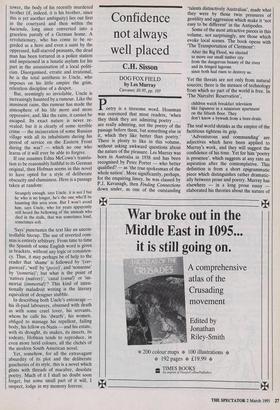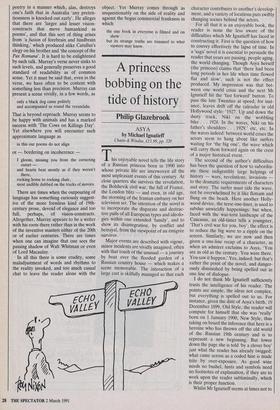Confidence not always well placed
C.H. Sisson
DOG FOX FIELD by Les Murray
Carcanet, f6.95, pp. 103
Poetry is a tiresome word. Housman was convinced that most readers, 'when they think they are admiring poetry . . . are really admiring, not the poetry of the passage before them, but something else in it, which they like better than poetry.' There is plenty to like in this volume, without asking awkward questions about the nature of the pleasure. Les Murray was born in Australia in 1938 and has been recognised by Peter Porter — who better qualified? — as 'the true spokesman of the , whole nation'. More significantly, perhaps, for the enquiring limey, he was classed by P.J. Kavanagh, then Finding Connections down under, as one of the outstanding `talents distinctively Australian', made what they were by thoie twin pressures of gentility and aggression which make it 'not easy to be different' in the Antipodes. Some of the most attractive pieces in this volume, not surprisingly, are those which evoke local scenes. The book opens with `The Transportation of Clermont':
After the Big Flood, we elected to move our small timber city from the dangerous beauty of the river and its fringed lagoons since both had risen to destroy us.
Yet the threats are not only from natural sources; there is the menace of technology from which no part of the world is free. In `The Narrabri Reservation',
children watch breakfast television like Japanese in a miniature apartment on the fiftieth floor. They don't know a bywash from a bore-drain.
The real world shrinks as the empire of the factitious tightens its grip.
`Adventurous and commanding' are adjectives which have been applied to Murray's work, and they will suggest the confidence of his tone. Yet for him `poetry is presence', which suggests at any rate an aspiration after the contemplative. This definition is from a short epigrammatic piece which distinguishes rather dramatic- ' ally between prose and poetry. Murray has elsewhere — in a long prose essay elaborated his theories about the nature of poetry in a manner which, alas, destroys one's faith that in Australia `any preten- tiousness is knocked out early'. He alleges that there are `larger and lesser vision- constructs that move humankind as poems', and that this sort of thing arises from `a fusion of forebrain and hindbrain thinking,' which produced alike Catullus's elegy on his brother and `the concept of the Pax Romance. It is hard to be enlightened by such talk. Murray's verse never sinks to such levels, and generally preserves a good standard of readability as of common sense. Yet it must be said that, even in the verse, we have often to be content with something less than precision. Murray can present a scene vividly, in a few words, as
only a black dog came politely and accompanied us round the verandahs.
That is beyond reproach. Murray seems to be happy with animals and has a marked success with `The Cows on Killings Day'. Yet elsewhere you will encounter such approximate language as in this our poems do not align or — bordering on incoherence - I gloom, missing you from the cornering outset -
and hearts beat mostly as if they weren't there, rocking horse to rocking chair, most audible dubbed on the tracks of movies.
There are times when the outpouring of language has something curiously suggest- ive of the more formless kind of 19th- century prose, devoid of elegance and too full, perhaps, of vision-constructs. Altogether, Murray appears to be a writer with his roots there rather than in the work of the inventive masters either of the 20th or of earlier centuries. There are times when one can imagine that one sees the passing shadow of Walt Whitman or even of Lord Macaulay.
In all this there is some crudity, some maladjustment of words and rhythms to the reality invoked, and too much casual chat to leave the reader alone with the object. Yet Murray comes through as unquestionably on the side of reality and against the bogus commercial frankness in which
the one book in everyone is filmed and on show but its strange truths are trimmed to what viewers may know.



















































 Previous page
Previous page